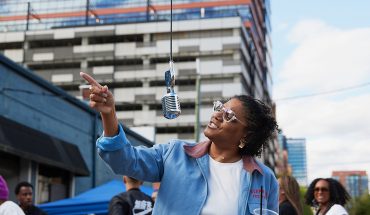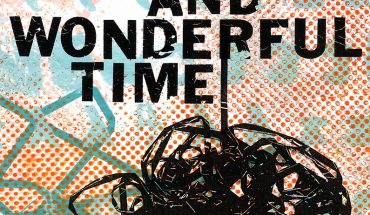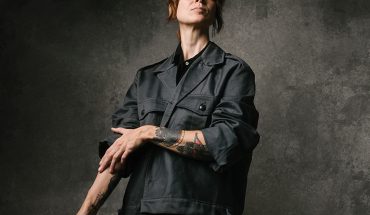Meet Ben Mabry and Brent Holloman, who create the moving sound of the Wilmington-based classic rock band Beta Radio.
by Wiley Cash | photography by Mallory Cash
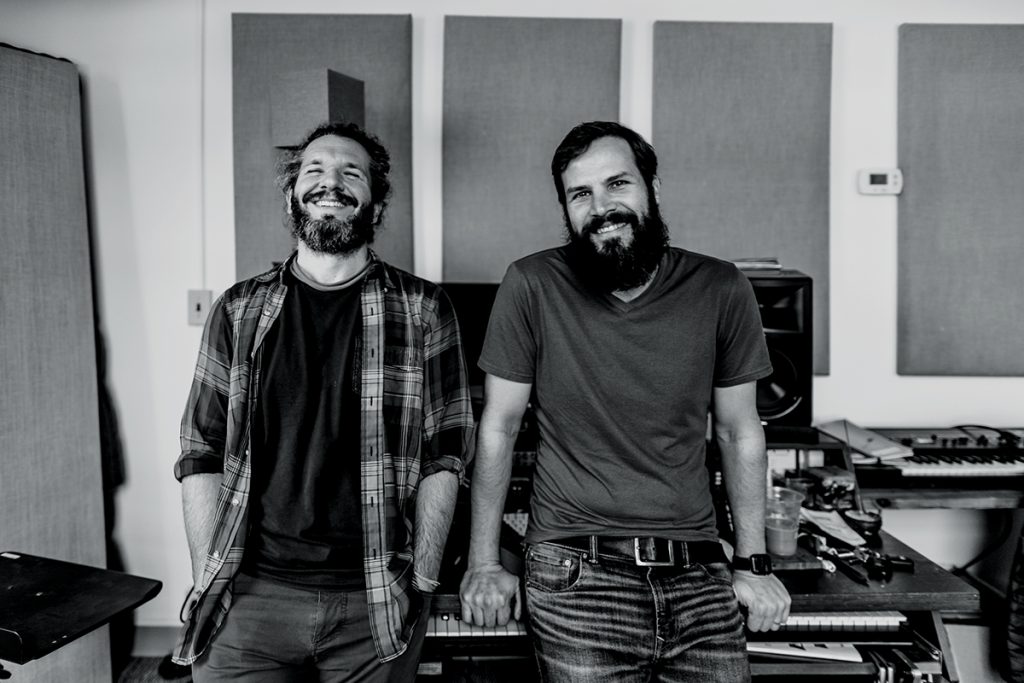
Ben Mabry, lead singer of the Wilmington-based, two-man band Beta Radio, was 8 years old the first time he was moved by music.
“My mom gave me this old tape from my aunt’s church,” he says. “And it was some kind of gospel. I don’t even remember the name of it, but I remember feeling the movements of the music, and just knowing something was happening inside me.”
That something kept happening to Mabry, whether it was in response to Christian music, Pearl Jam or the classic rock he listened to with his dad. As a teenager, while attending summer camp in the mountains, he met someone who responded to music the same way. It was Brent Holloman, a fellow Wilmingtonian Mabry had never met before.
“I remember Ben being this funny prankster,” Holloman says, cracking a smile while recalling their time at camp. “He would carry around a spray bottle and walk up behind people, fake a sneeze, and then spray their necks.”
“I just thought you were cool because you could play ‘Stairway to Heaven,’” Mabry says. “Brent was the first person I knew who was really good at guitar.”
We’re standing in their studio high up in the Art Deco Murchison Building in downtown Wilmington. The room’s windows peer out on a gray day during a fall holiday weekend. Guitars and banjos rest in their racks along one wall; a drum kit is set up nearby.
Everywhere you look are scribbled scratches of songs, mementos fans have sent, boxes of tea and snacks: the detritus of two old friends who’ve spent long hours making music.
When they returned home to Wilmington, they began playing music together with Holloman joining Mabry’s band on bass. The band was all electric guitars and drums, but after practice Mabry and Holloman would get together to play acoustic, realizing their shared love for artists like Simon and Garfunkel.
Nearly two decades later, Beta Radio is still primarily an acoustic guitar band, and with nine albums to its name and hundreds of millions of streams across various music platforms under its belt, it’s safe to say they are now the ones moving others with their music.
Many of the band’s albums are dominated by a gorgeous, yet restless energy and lyrics that never quite settle on answers. That sense of struggle reflects the years of spiritual yearning Mabry experienced as a younger man searching for answers during time in college and the military, and later during travels through Peru, Hawaii, Costa Rica and the desert Southwest.
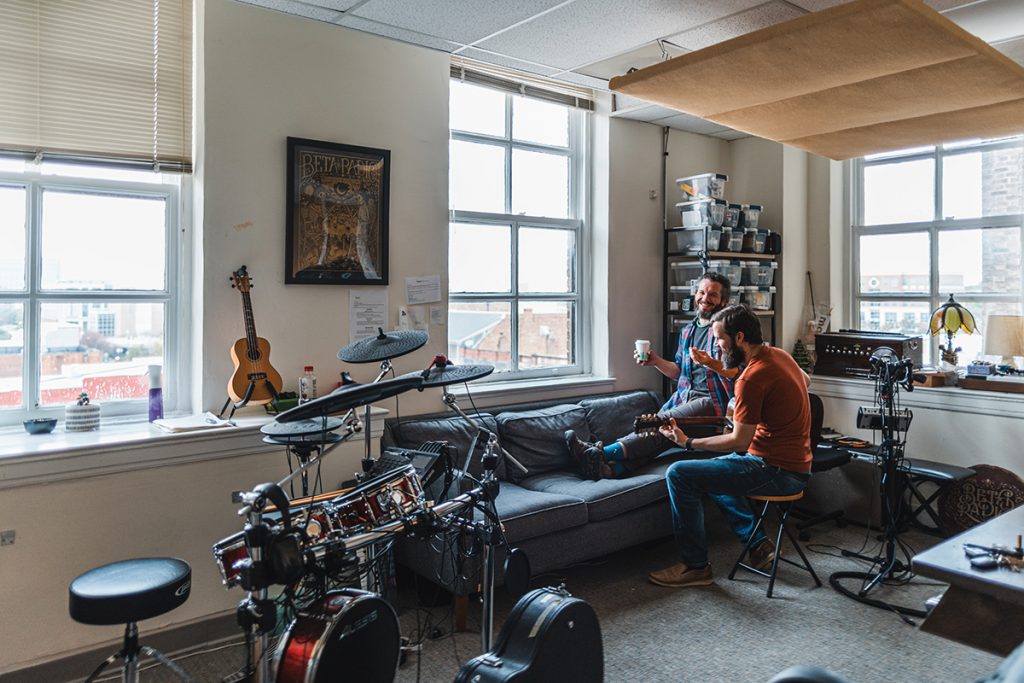
He was writing lyrics the whole time. “In 2009, he went to Hawaii and ended up getting inspired by something there,” Holloman says. “He’d send me these voice memos of songs, and I would write the guitar parts. And then I went to Ireland and picked up the banjo, and when I came back we started adding banjo to a few of the songs.
Soon we had five or six songs, and we thought, Hey, these are pretty good. Maybe we should record them. By the time we got into a studio we had seven or eight.”
Then the real work began. The newly minted Beta Radio had official letterhead made, and they spent hours packaging CDs of their debut album, Seven Sisters, and sending them off to music blogs and magazines, hoping for reviews. They also submitted songs to the new streaming services.
“Friends were telling us, Hey, I heard your song the other day on some coffeehouse playlist,” Holloman says. And people weren’t just listening to Beta Radio on streaming services; they were hearing the band and downloading its album.
Over the next 10 years, Beta Radio released follow-up albums at a steady clip, all of them bolstered by the millions and millions of times their songs were listened to on streaming services. Most bands have to tour voraciously in support of their records, but Beta Radio was able to stay home, working on new music.
As the pandemic emerged in 2020, the band began writing and recording the songs that would end up on 2021’s Year of Love. Once the world went into lockdown, Mabry’s geographic searching came to a standstill and forced him to investigate exactly what it was that he’d been looking for. The songs on that album are mystical explorations of various forms of love, the music often swelling into walls of strings and guitars, marked by lines like, “In my soul, there’s something I want to say.”
If Year of Love is about searching for something — language, answers, love — 2024’s Waiting for the End to Come is about finding it. The songs feel urgent, tactile, narrative-driven and grounded in a physical space. This album marks the first time Mabry and Holloman have co-written songs with others, and the experience of spending time in Nashville and sharing ideas with fellow songwriters brought them closer while elevating what they could do musically.
“There’s just no other way to say it: I began to vibrate,” Mabry says of those days writing songs with Holloman and others in Nashville. “Just like that guitar would if I were to strum it; I was vibrating because I was the energy.”
“That whole week flew by,” Holloman adds, “and it was like we were living on a high. It was the first time we co-wrote with other people, and it was the first time we were writing songs this quickly.”
One song from the co-writing experience is “This One’s Going to Hurt,” which will be released as the album’s first single this month. The line itself was written by a co-writer named Henry Brill, and its honesty and directness struck Mabry.
“I would never write that line,” he says, “but I love it because it’s an admission, it’s an acknowledgement. And in all the prior stuff — Year of Love, for example — so much of the music up to now was me knowing that I had something to say but being afraid to fully say it.”
The two kids from Wilmington who’d been moved by music found themselves moved once again.
This article originally appeared in the January 2024 issue of WALTER magazine.


